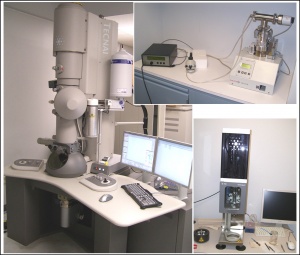Difference between revisions of "Transmission Electron Microscope"
(Created page with '*Electron Microscopes The electron microscope that we saw was a transmission electron microscope (TEM). It works by sending a beam of electrons from a heated ‘V’-shaped tungs...') |
|||
| Line 5: | Line 5: | ||
Electromagnetic lenses do to electrons what glass lenses do to light. By changing the electric and magnetic field (controlled by the input current), the plane of focus can be changed and the magnification can be specified. | Electromagnetic lenses do to electrons what glass lenses do to light. By changing the electric and magnetic field (controlled by the input current), the plane of focus can be changed and the magnification can be specified. | ||
| − | [[File:tecnai_tem.jpg]] | + | [[File:tecnai_tem.jpg|thumb|left|TEM]] |
Latest revision as of 12:15, 20 May 2009
- Electron Microscopes
The electron microscope that we saw was a transmission electron microscope (TEM). It works by sending a beam of electrons from a heated ‘V’-shaped tungsten filament (an electron gun) towards the stage using an anode and a potential of 100 KeV. The electrons partially pass through the specimen depending on where it is electron dense and where it is electron transparent. This beam now has information about the structure of the specimen that is magnified using electromagnetic lenses. It falls on a screen that fluoresces on contact with an electron (Zinc Sulphide screen). The image can also fall on photographic plates/film and be saved.
Electromagnetic lenses: Electromagnetic lenses do to electrons what glass lenses do to light. By changing the electric and magnetic field (controlled by the input current), the plane of focus can be changed and the magnification can be specified.
